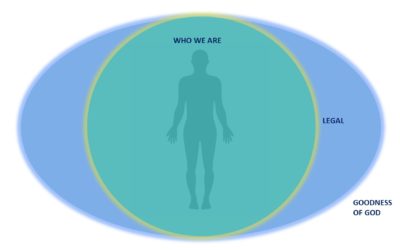 Now let’s talk a little bit about positional vs. practical righteousness. The fact that they still do sinful actions after they were born again, bewilders believers. On the one hand, the Bible says that Christians ARE ALREADY righteous, but on the other hand, in reality, they don’t see that righteousness MANIFESTING YET completely. There is a tension between ”the already” and ”the not yet,” and there is a so-called positional righteousness vs. practical (or behavioral) righteousness theory. The way these two types of righteousness are usually understood is the following: believers are still sinners in their spirit’s nature, and only their legal standing with God changed. In other words, God just considers believers to be righteous from a legal standpoint, but they are not righteous in reality in their nature as well. That’s the definition of positional righteousness. Then these believers have to prefect their righteousness by improving their external behavior. They accomplish that by trying to be as moral as possible – that is, reading the Word to see what God expects from them morally and then trying to implement it in their lives. That’s the definition of practical righteousness. However, these two terms create the false assumptions that I’ve just described unconsciously in believers’ minds and don’t depict accurately what is the actual truth. That happens also because of a lack of understanding of the concepts of spirit, soul, and body. A better terminology for the two types of righteousness would be the following one: innate righteousness vs. activated righteousness.
Now let’s talk a little bit about positional vs. practical righteousness. The fact that they still do sinful actions after they were born again, bewilders believers. On the one hand, the Bible says that Christians ARE ALREADY righteous, but on the other hand, in reality, they don’t see that righteousness MANIFESTING YET completely. There is a tension between ”the already” and ”the not yet,” and there is a so-called positional righteousness vs. practical (or behavioral) righteousness theory. The way these two types of righteousness are usually understood is the following: believers are still sinners in their spirit’s nature, and only their legal standing with God changed. In other words, God just considers believers to be righteous from a legal standpoint, but they are not righteous in reality in their nature as well. That’s the definition of positional righteousness. Then these believers have to prefect their righteousness by improving their external behavior. They accomplish that by trying to be as moral as possible – that is, reading the Word to see what God expects from them morally and then trying to implement it in their lives. That’s the definition of practical righteousness. However, these two terms create the false assumptions that I’ve just described unconsciously in believers’ minds and don’t depict accurately what is the actual truth. That happens also because of a lack of understanding of the concepts of spirit, soul, and body. A better terminology for the two types of righteousness would be the following one: innate righteousness vs. activated righteousness.
These new designations create better assumptions that are closer to reality, because it’s not just the legal standing of believers that has changed into righteousness, but the nature of most important part of their identity (that is, their spirit) has become righteousness in its essence as well. Has Adam’s spirit been affected only legally when he sinned in his body? Did he only exchange legal positions? No, his spirit was tangibly affected and changed in its essence. His spirit became death. In the same way, the spirit of Christians has become righteousness in essence. Only their minds and bodies have to catch up with the change that took place in their spirit and their mind needs to be renewed. The so-called positional righteousness should cover or describe the change both in the legal standing (status) and the vital state of the spirit. The practical (or behavioral) righteousness should cover or refer to the renewal of the mind in all aspects, not just morally.
We can use a smartphone with all its potentialities as a comparison to better illustrate the innate righteousness and activated righteousness. The embedded possibilities that the smartphone comes with can be likened to innate righteousness, while learning how to use the smartphone in our daily lives (learning about apps for different needs, installing them and then using them) can be compared to the activated righteousness. Meditation on the Word and renewal of the mind is the process of activating righteousness. For instance, 1 Corinthians 10:13 is a verse in the area of temptations and self-control that needs to be meditated upon, personalized, and applied. 1 Peter 2:24 is a verse in the area of divine physical healing that should be used for meditation, personalization, and application in our daily lives. Likewise, 3 John 1:2 is a passage in the area of prosperity in all areas of life, and 2 Corinthians 8:9 as well as 2 Corinthians 9:8 are two passages in the area of prosperity as well, but more specifically related to finances (that is, wealth, debts, and loans).
Newborn babies have all the potentialities of the human nature in them at birth (i.e. playing instruments, swimming, painting, engineering, driving cars, manufacturing, etc.), but they need to grow, develop their potentialities, and learn some of these skills by practicing them until they are activated and become an integral part of them. They become automatic as part of their being at the subconscious level. In the beginning of learning a new habit or skill, the process is difficult (i.e. learning to drive a car), but through practice, it becomes easy as second nature. People born of God are the same. Ephesians 2:10 says that we are His workmanship created in Christ Jesus for good works, which God prepared before hand so that we would walk in them.
On one hand, believers were created perfect and complete, that is, in their spirits and that is shown in verses like Hebrews 10:14 and 12:23:
Hebrews 10:14 (NKJV)
14 For by one offering He has perfected forever those who are being sanctified.
Hebrews 12:23 (NKJV)
23 to the general assembly and church of the firstborn who are registered in heaven, to God the Judge of all, to the spirits of just men made perfect.
On the other hand, they are also being perfected in faith, love, and holiness in their minds (that is, in their reasoning, thinking, will, emotions, speech, conscience) and in their bodies (that is, in their actions). We can see that illustrated in James 2:22, 1 Peter 5:10, and 1 John 4:12:
James 2:22 (NKJV)
22 Do you see that faith was working together with his works, and by works faith was made perfect?
1 Peter 5:10 (NKJV)
10 But may the God of all grace, who called us to His eternal glory by Christ Jesus, after you have suffered a while, perfect, establish, strengthen, and settle you.
1 John 4:12 (NKJV)
12 No one has seen God at any time. If we love one another, God abides in us, and His love has been perfected in us.
There is one more passage in 2 Corinthians 7:1 that talks about perfecting holiness, but also about the possibility of a spirit to be defiled and we need to explain that. Let’s read the passage:
2 Corinthians 7:1 (NKJV)
1 Therefore, having these promises, beloved, let’s cleanse ourselves from all filthiness of the flesh and spirit, perfecting holiness in the fear of God.
You may wonder how can a spirit be defiled since we just learnt that it’s righteous? First, in the same way that defilement of the body doesn’t change the nature of the body, the defilement of the spirit doesn’t change the nature of the spirit. Second, defilement of the body is generally related to sexual immorality in the Scripture, while defilement of the spirit is related to idolatry and wrong worship. That makes sense when we also think about the kind of worship God likes – in spirit and truth (John 4:23). Furthermore, the context of 2 Corinthians 7:1 verse, meaning chapter 6, is about being yoked with unbelievers and about worship of idols in Corinth. Those things can defile the spirit, but cannot change the righteousness of the spirit’s nature, or cause the loss of salvation.
Listen / Watch / Download
You can listen to the audio message of this article, watch the video message, or download it in various formats (mp3 / mp4 / pdf) from the following link:






